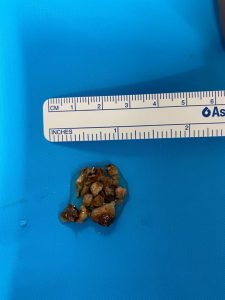Kidney stone related pain (renal colic) occurs when a stone moves through the ureter or when it becomes lodged within the ureter. This pain could be very severe and you may need prompt assessment for pain relief and treatment!
Kidney stone related pain (renal colic) occurs when a stone moves through the ureter or when it becomes lodged within the ureter. This pain could be very severe and you may need prompt assessment for pain relief and treatment!

Whilst we always recommend consulting your urologist if you have symptoms of kidney stone disease, in this blog we discuss a few things you can do to prevent and manage kidney stone pain / renal colic at home.
Kidney stone pain relief: What are kidney stones and how are they treated?
Kidney stones are hardened mineral/salt deposits that form in the urinary tract. These eventually need to travel through the urinary tract in order to exit the body and can cause intense pain. On the other hand, very small kidney stones often pass through the urine on their own with minimal medical intervention. Most cases of kidney stones are treatable with pain relief medications, fluid therapy and other types of medical intervention (such as shockwave lithotripsy).
If you’ve ever experienced the pain of kidney stones, you’re likely to agree that it isn’t something that you easily forget. Thankfully, the specialist urologists at Melbourne Urology Centre are experts, highly experienced in the treatment of kidney stones, so you know you’re in capable hands and that you will receive prompt and effective kidney stone pain relief.
Kidney stone pain relief: What are the options?
Kidney stone pain relief is just one aspect of the treatment for kidney stone disease. The type of treatment that your urologist recommends will depend on what type of stone(s) you have and what the underlying cause for these is.
It is very important to seek your doctor’s advice if you suspect that you may have kidney stone disease. Despite the fact that some of the remedies noted below can provide some kidney stone pain relief, or at least ease the symptoms a little, kidney stones can cause severe pain and even infection, especially if they have become stuck in the urinary tract.
Kidney stone pain relief: Drink more water
Dehydration is one of the main causes of kidney stones, so staying hydrated is one of the most important factors in not only preventing kidney stones from forming, but for the effective treatment of kidney stone disease and in obtaining kidney stone pain relief. The general rule of thumb is to aim to drink at least 2L of water per day. You can also try adding some lemon juice to your water. Not only will lemon juice make your water more palatable, it contains citrate, a natural compound that helps to break down calcium deposits and slows their growth.
Kidney stone pain relief: Keep moving
For most people, walking around or even doing some basic, gentle stretches will provide some kidney stone pain relief and ease the discomfort.
Kidney stone pain relief: Apply some warmth
Taking a hot bath or shower or applying a heat pack to the sore side for 20-30 minutes at a time throughout the day, can provide some kidney stone pain relief. Make sure that you continue to sip fluids so that you remain hydrated and assist your kidneys in continually flushing.
Kidney stone pain relief: Take some pain relief medication
You can take medications such as paracetamol, ibuprofen, or another medication that your doctor has prescribed, to help you with kidney stone pain relief. Ensure that you take the correct dosage and only as directed on the product label. Your doctor may also have prescribed medications such as alpha-blockers. These drugs help to relax your ureter, making it easier for any stones to pass from your kidneys to your bladder, where they can then be urinated out more quickly and less painfully.
When to go to seek immediate medical attention:
If you have pain that prevents you getting comfortable, or you can’t sit still because of your discomfort, you should visit your nearest emergency department. You should also seek immediate medical attention if your pain is accompanied by blood in the urine, or you have difficulty or severe pain when trying to urinate. Fever and chills, as well as nausea and vomiting, with pain are also reason to visit your local emergency department.
Please note that the information regarding kidney stone pain relief detailed in the blog post above, is intended for educational purposes only and should not be taken as general medical advice. If you are experiencing painful symptoms or you suspect that you may have kidney stones, please contact us right away to make an appointment with one of our specialist urologists for a correct diagnosis and individual treatment plan, or head to your local emergency department.
